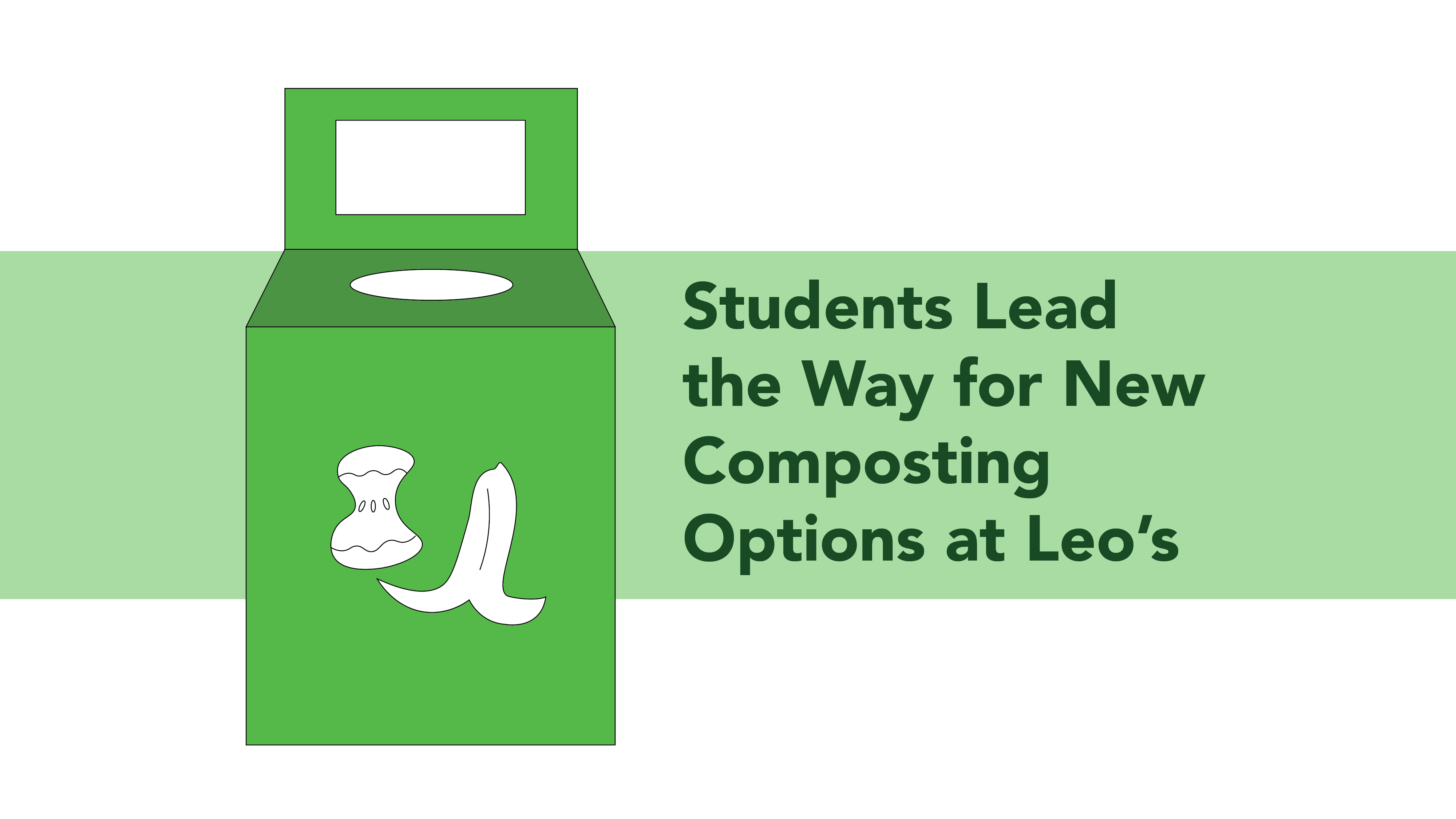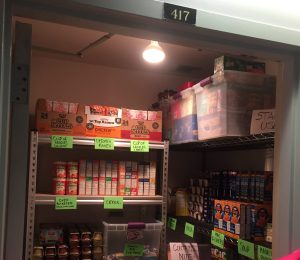As Georgetown University Student Association’s (GUSA)sustainability chair, Samantha Panchèvre (SFS ’19) knows that there is composting at Leo O’Donovan’s Dining Hall. But she also knows many students are unaware of it. “Either they see the bins or they haven’t, and they don’t know that we compost,” Panchèvre said. “I don’t think people know that Leo’s composts in the kitchens, and people think whenever the stations are closed we aren’t composting at all.”
Now, a new pilot program to expand composting to Leo’s diners is being pushed through by a student initiative.
When the upper level of Leo’s switched from an in-house dining system to a to-go model in the fall of 2017, Caroline Flibbert (COL ’21) noticed that the new structure created more garbage, and food waste in particular. The to-go model doesn’t allow for the reusable plates or cutlery that are typical in a dining hall, and students now throw out what they don’t eat instead of putting it in dish return. Flibbert felt she had to take action. Her planning eventually led the university to start a pilot post-consumer composting program on the upper floor of Leo’s.
Composting involves collecting food waste and other organic matter into a receptacle so it can eventually decompose. The compost can be used as fertilizer or simply be added back to the earth, reducing the amount of waste that has to go to a landfill. Audrey Stewart, director of the Office of Sustainability, wrote in an email to the Voice that Georgetown has been composting pre-consumer waste—namely kitchen scraps—at Leo’s and other dining locations on campus since 2010. The additional new, post-consumer program would be different, relying on diners to sort their own food scraps into the composting bins instead of just workers composting kitchen waste, like in the pre-consumer system.
Flibbert got in touch with Stewart and Aramark, the contractor that runs dining locations on campus. “Together we started having a series of biweekly meetings to sit down and say, ‘Hey, how can we make Leo’s more sustainable?’” Flibbert said. From these meetings, the new composting program was born.
In the summer of 2018, Flibbert started an internship with the Office of Sustainability to help implement the program. They installed large, green waste bins and increased the amount of compostable products in the dining hall, such as cutlery and straws.
When the semester began, so did the new program, and the composting bins were opened. Interns at the Office of Sustainability had the unenviable job of manually sorting through the food waste in the bins to assess the level of contamination.
“We literally took the compost bins from the sites, and we sorted out the compost by ourselves, by hand,” Flibbert said. “We saw how much was waste, how much was compost, and how much contamination there was. The results weren’t great.”
Interns found plastic, chip bags, and other contaminants in the compost containers, which would have made the whole bin unusable if they had not been sorted out. “Since composted materials cannot include non-compostable materials … it is important to understand the best ways to reduce cross-contamination between compostable and non-compostable materials,” Stewart wrote.
The interns were not just looking for contaminants. In order to estimate the cost of a full-blown composting program, they also gauged the amount of compost collected and the time it took to sort. The interns removed contaminants from the compost and combined the food waste with the pre-consumer compost from Leo’s kitchens. The compost was sent to Maryland Environmental Services, which deals with waste and has sites to process compost.
Noelle Gignoux (SFS ’22), head of composting for Georgetown Renewable Energy and Environmental Network (GREEN), hopes that education will be the program’s next focus. “The main issue with the upstairs composting is the contaminants, because students don’t know how to compost,” Gignoux said. “I think the education piece really needs to be ramped up, and that’s something that [the Office of Sustainability] could be working on even more.”
Panchèvre believes that in addition to general education, the process must be simplified for students to use it. “I think [university administrators] underestimate how much students care about the environment,” Panchèvre said. “If there is a very clear system for disposing their waste properly, most people will take an extra two seconds and do the right thing because they want to feel good about themselves.”
The second round of the pilot program includes adding volunteers—interns from the Office of Sustainability and students in GREEN—to explain to Leo’s customers how to sort waste. “This semester, the pilot is focusing on educating diners about composting,” Stewart wrote. “During February, the post-consumer compost stations in Leo’s Market will be open on selected weeknights from 5 to 7 p.m. when volunteers are available to educate and help diners properly sort their compostable materials.”
Outside of Leo’s, GREEN is also looking for other ways to reduce waste on campus. They are hoping to receive money from the Laudato Si’ Fund, a Georgetown grant supporting sustainability projects, for a program in conjunction with Compost Cab, a company which facilitates composting. Compost Cab would deliver composting buckets to student kitchens and then collect the compost and clean the buckets every week, allowing students to compost on their own.
Nareg Kuyumijan (SFS ’21), president of GREEN, is working on educating new students on campus about waste. He, along with the New Student Orientation (NSO) coordinators, is creating a workshop for orientation advisors (OAs). “One big thing we are working on is an NSO training for OAs on waste management and other sustainability programs which would specifically be on recycling and composting,” Kuyumijan said. The new program would teach OAs about composting on campus. They would show new students how to compost, including after dinner in Leo’s and if the Compost Cab program is funded, in their own kitchens. Then, the cycle of education would continue.
“As much as we educate the students right now, we have to face the reality that in four years there is going to be a completely different demographic,” Kuyumijan said. “Hopefully in four years’ time, people won’t be talking about these issues anymore.”





